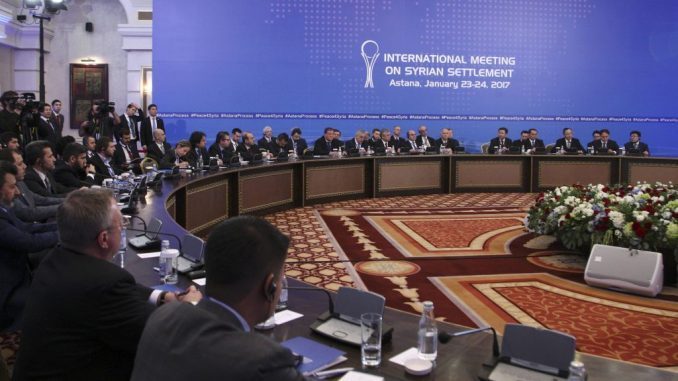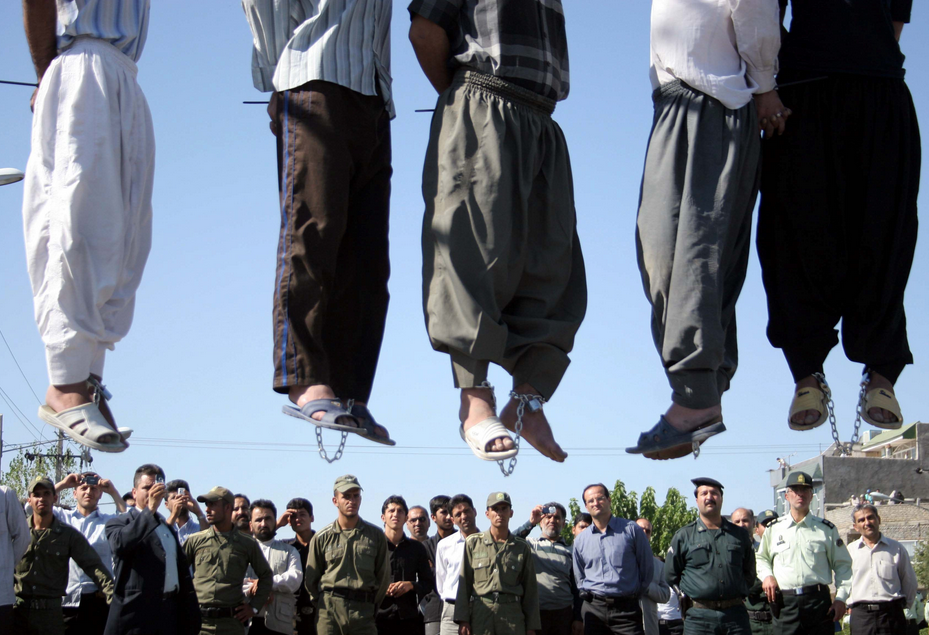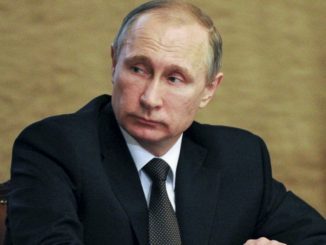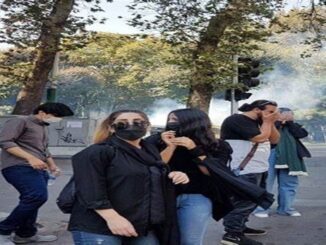
Participants arrived in Kazakhstan’s capital Astana on Monday for the third round of Syria settlement talks, Kazakh Foreign Minister Kairat Abdrakhmanov said, while the rebels asked first to delay the meeting then said they won’t participate.
Russia said it has a new plan for Syria peace talks which can be achieved with powers that have a real effect on the Syrian ground after its forces backed Assad regime to achieve many victories against the opposition and tilted the tide of war in his favor.
Russia, Iran, and Turkey said they were ready to help broker a Syria peace deal, and organized peace talks meeting in Kazakhstan on January 23.
The talks have ended with Russia, Turkey, and Iran making a joint statement about the consequences of the talks and agreeing on a mechanism to support a delicate ceasefire and to support a new round of peace talks in Geneva.
The second round of Astana talks was held in Kazakhstan’s capital on February 15-16. On Wednesday, Russian, Iranian, Jordanian and Syrian delegations held a number of technical meetings.
However, the meeting ended without a final statement because the opposition refused to sign it.
The Opposition refused to discuss any other issues such as the constitution, holding elections or any other political issues, Alloush pointed out adding that “negotiations about ceasefire mechanisms will be taken to Ankara,” without specifying any date or giving further details.
At the end of the meeting, Russian ministry of foreign affairs declared that a number of issues have been agreed upon to de-escalate the situation in Syria, including creating a strict mechanism to monitor the ceasefire by forming a trilateral Russian, Turkish and Iranian committee.
New round of Astana talks
“The delegations are arriving today to participate in the next round of the Astana process for resolving the situation in Syria,” Kazakh Foreign Minister Kairat Abdrakhmanov said.
On Tuesday, the city will host another two-day meeting attended by representatives from Russia, Turkey and Iran.
“For now, I cannot tell you who else will attend the talks,” Abdrakhmanov said. “We are waiting confirmation from other participants.”
The Syrian opposition on Saturday called for the postponement of the negotiations until March 20 because of ceasefire violations. Opposition delegate Osama Abu Zaid tweeted that the opposition would not attend.
The Kazakh Foreign Ministry also sent invitations to the UN, the US and Jordan. Abdrakhmanov said Jordan’s presence would ensure the opposition’s participation.
He added: “The format and the agenda of the talks depend on the guarantor countries — Russia, Turkey, and Iran.”
Tehran-based media said the Iranian team had departed for Astana, headed by Deputy Foreign Minister for Arab and African Affairs Hossein Jaberi Ansari.
Mevlut Cavusoglu and Sergey Lavrov, the foreign ministers of Turkey and Russia respectively, spoke by telephone Monday about the talks, Russian Foreign Ministry said in a statement.
They discussed preparations for the meeting and the implementation of agreements to maintain the ceasefire, as well as the establishment of the “successful” inter-Syrian negotiations.
Turkey is also likely to raise the level of its representation at the new meeting on Syria in Astana, compared to the previous one in mid-February, and send Foreign Ministry Deputy Undersecretary Sedat Onal as the delegation head, a source at the talks said.
Sedat Onal headed the Turkish delegation at the first round of Astana talks in January. However, the last meeting in mid-February was attended only by the foreign ministry experts from the Turkish side.
“Turkey is going to send a Foreign Ministry’s Deputy Undersecretary, ” the source said.
Rebels will not participate
The Syrian rebel factions will not attend a new round of negotiations with government figures in the Kazakh capital, according to various rebel representatives.
Colonel Ahmad Othman, who heads the Turkish-backed Sultan Murad rebel brigade, said it was awaiting a Russian response to a letter that demands Moscow acts as a guarantor and ends violations of a ceasefire brokered last December by Russia and Turkey.
“Nothing has been implemented so far,” said Othman, complaining of Russian strikes on civilians and assaults by the Syrian army in rebel-held areas.
“Moscow has not lived up to its commitments. The main demand is stopping the bombardment and displacement of people,” Othman added.
Osama Abu Zeid, an opposition delegation spokesman, told AFP on Monday the same.
“Rebel groups have decided not to participate in Astana,” said Osama Abu Zeid, saying one reason for the boycott was “unfulfilled pledges related to the cessation of hostilities.”
“We decided not to participate in Astana because the reinforcement of the ceasefire was not implemented,” said Ahmad Othman, commander of the Ankara-backed Sultan Murad rebel group.
“The regime and the militias are continuing to bomb, displace, and besiege,” he told AFP on Monday, saying rebel groups had informed the talks’ sponsors of their decision.
According to Syrian daily Al-Watan, which is close to Syrian president Bashar al-Assad, the government’s delegation was scheduled to arrive in Astana on Monday.
The delegation will be headed once again by Syria’s representative to the UN, Bashar al-Jaafari, who has also led the government’s representatives in parallel UN-backed talks in Geneva.
A fresh round of UN-brockered peace talks in Geneva is set to begin on 23 March and will focus on governance, constitutional process, elections, counter-terrorism and possibly reconstruction.
The Syrian crisis began as a peaceful demonstration against the injustice in Syria. Assad regime used to fire power and violence against the civilians and led to armed resistance. 450.000 Syrians lost their lives in the past five years according to UN estimates, and more than 12 million have lost their homes.



